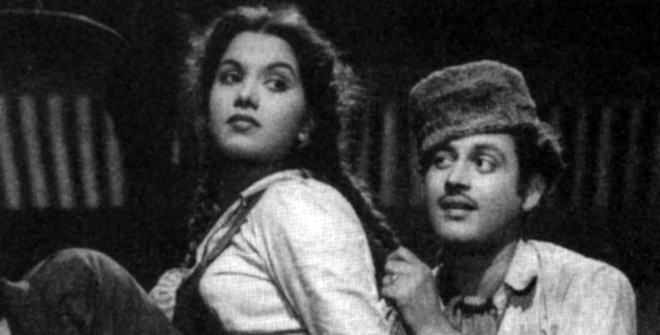

Qissa Guru Dutt ka was Zahid Akkasi’s last manuscript which he completed before his death in January 2013. He was also compiling a book on Pakistani actresses; that work is now being completed by his wife Roshan Ara Zahid, who is also compiling a selection of her late husband’s magazine articles. He had been writing regular columns and articles on various aspects of Pakistani showbiz for many years but film was his real passion. In the early days of his career, when cinema was king, he also gained some practical experience in the fields of script-writing and direction.
1950s are rightly called the Golden Age of Indian cinema: on the one hand people were enjoying the romantic realism of Dilip Kumar, (Mela, Babul, Deedar) and on the other Raj Kapoor was producing movies based on social realism (Awaara, Jaagtay Raho, Phir Suba Hogi). Parallel to these trends was running a third strand which is now termed as Film Noir -- Indian Style.
Guru Dutt began his directorial career with Noir movies like Baazi, Jaal and Aar-Paar, and then gradually moved to socially conscious themes and psychological drama. Zahid Akkasi belonged to the generation that grew with Guru Dutt movies. He seems to have had a deep commitment with the man and his movies, which is evident from his extensive research: he even managed to get hold of the original screenplay of Jaal -- the controversial movie that caused the first cinema-related political agitation in Pakistan.
To protect the Pakistan film industry, which was still in its infancy, a quota system was introduced for the exhibition of Indian movies, and the import of Jaal was considered a violation of that restriction. There were big public rallies led successfully by famous film personalities including Madam Noor Jehan, Santosh Kumar, Sudheer, Alauddin, M.Ismael, Bibbo, Naina and others. As a consequence, the riot-police came into action and on July 9, 1954 many arrests were made on McLeod Road Lahore, where law enforcing agencies surrounded a protest rally led by W.Z.Ahmed, Shaukat Hussain Rizvi, Saifuddin Saif and Sibtain Fazli.
Zahid Akkasi tells us that the controversy and agitation served as a big publicity campaign in Pakistan for this Guru Dutt movie, and even those who had never heard the name of Jaal became curious about it.
The book starts with a short biography of Guru Dutt, but when we reach the climax of his life story, the author suddenly moves from the real world to the world of fiction. Akkasi generously quotes from the novel Ajeeb Aadmi by Ismat Chughtai, especially the part where the ‘other woman’ has entered the scene and a great domestic crisis starts. Despite the fictitious names, the reader can easily identify the characters of Guru Dutt, his wife Geeta Dutt and the ‘other woman’ Waheeda Rehman.
The next chapter deals with the early struggle period of Guru Dutt when he is working as an apprentice with Bengali film directors Gyan Mukherjee and Amiya Chakarvorty. That is when he meets a handsome young man, a graduate of Government College Lahore, struggling like him but in the field of acting. This young man is Dev Anand, who later on plays the lead role in Guru Dutt’s directorial debut Baazi.
There is a whole chapter about an autobiographical sketch of Waheeda Rehman. It was just a chance encounter in Hyderabad which introduced this small, thin, shy girl to the great film director. Rehman had appeared in just one Telegu film and the only skill she had at that time was South Indian dance, Bharatnatyam.
Guru Dutt called her to Bombay for a screen test and the first question he asked was, "Are you fluent in Hindi?" "Nahi" came the innocent answer, "mujhay Hindi bilkul nahi aati" ("No, I don’t know Hindi at all")
"But that’s what you are speaking," said a perplexed Dutt
"Oh, yeh tuo Urdu hai" … and Guru Dutt burst into laughter.
It has been a common belief that Waheeda Rehman entered Guru’s life as a soft gust of wind but soon turned out to be a furious tornado that ruined Guru Dutt’s domestic life. Eventually he was a lonely man, living separately from his wife Geeta Dutt and three children. Rehman has always remained silent on the subject and even in her official biography Conversations with Waheeda Rehman by N.M.Kabir, she calls it a private matter. Zahid Akkasi however managed to quote from her more recent interviews where she has plainly said that there was no such relationship between them; that she respected her mentor a lot and respect should not be taken as a love affair.
To the obvious question why Guru Dutt drank himself to death at the peak of his career, she says, "Noboby really knows what exactly happened at the night of October 10th, 1964. It could either be an accident, or may be Guru Dutt sahib was so depressed about the commercial failure of his ambitious production Kaghaz kay Phool that he ended his life. I can believe it because he had tried it twice before and unluckily he succeeded in this third attempt".
The epilogue is written by the publisher Tufail Akhtar himself, in which he not only pays tribute to the creator of great movies like Aar-Paar, Mr.&Mrs.55, Jaal, Pyaasa, Chaudhvin ka Chand and Sahib, Bibi aur Ghulam, but also rekindles the curiosity in the readers’ minds about the unsolved case of Guru Dutt’s mysterious death/suicide.